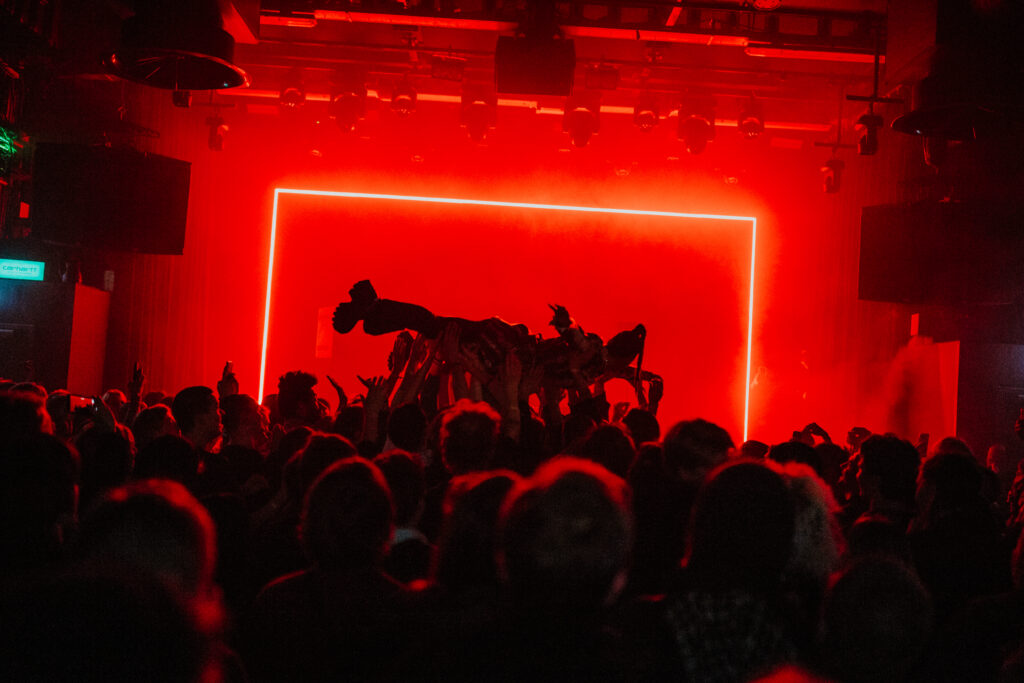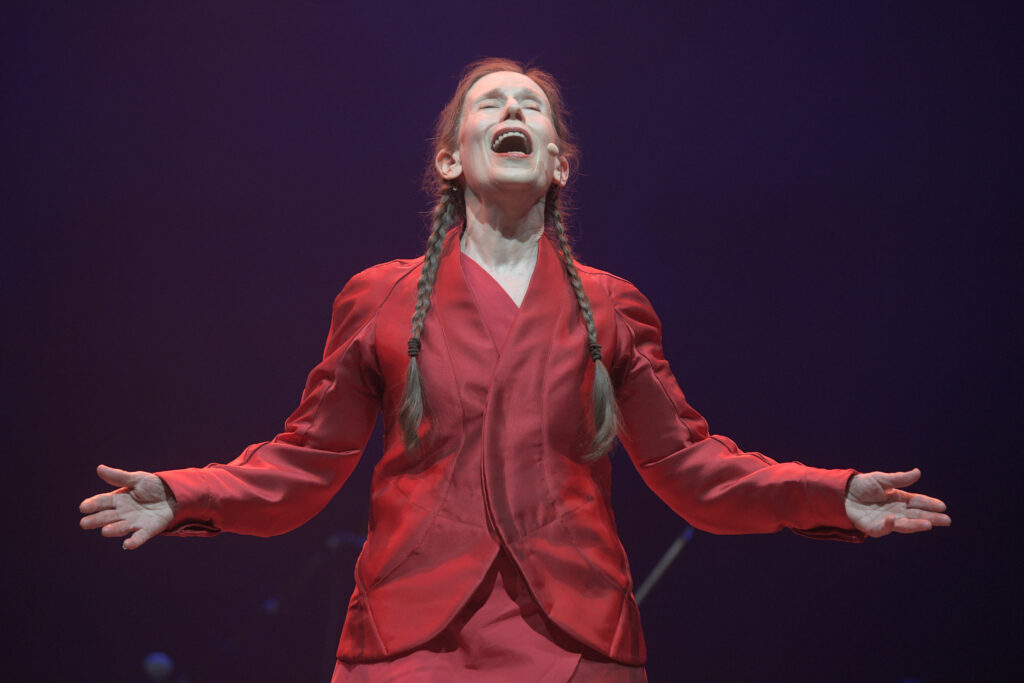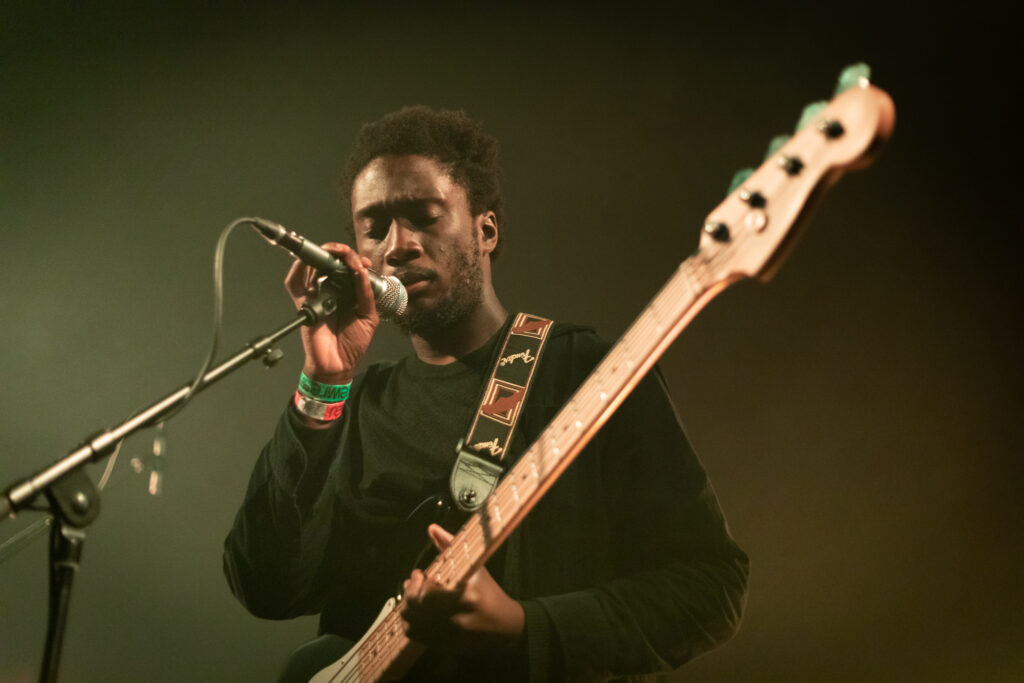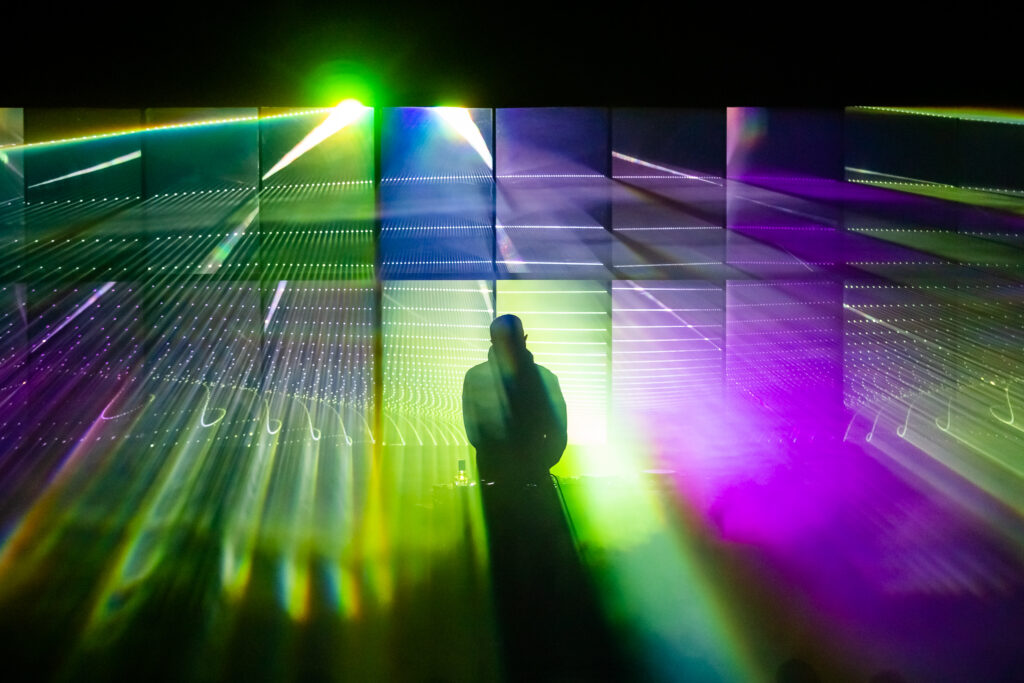Starting with a disclosure: I missed the first day and night of Rewire Festival in The Hague due to a cancelled flight. Mind you, the wind blows heavily in the Netherlands sometimes. And that evening it did in Switzerland as well, making it impossible for planes scheduled to head north to take off. Due to the cancelation, some highly anticipated performances were taking place without me: no Tirzah and no Blackhaine. But I made do with short videos on Instagram, grudgingly accepting the fact that I missed a raucous performance by the Salford-based choreographer and musician which even made Eartheater [see zweikommasieben #18] crowdsurf.
After a stress-free and automated re-booking by Switzerland’s leading airline (this not an ad, of course, but we’d be willing to have that conversation), I arrived in the Dutch coastal town via Amsterdam on Saturday. I was eager to get going and to see some performances in the two remaining days. Said plan which, thanks to Rewire’s set-up in different locations in The Hague in close proximity to each other, proved to be nothing but enjoyable. It’s been a breeze to see different things back to back without the agenda feeling crammed or without ever settling into one groove too much. I am well aware that I missed plenty of things, but the sooner one accepts this to always be the case, the easier it is to keep a piece of mind. (That’s a life lesson right there). The locations I spent most of my time in were Theater aan het Spuui, nightlife affiliated Paard, and Amare, a new, slick, and huge center for performing arts in downtown The Hague that wouldn’t feel out of place in downtown New York. The Shed, but make it Dutch.
If I’d want to make out a red thread running through what I’ve seen of Rewire’s diverse programming this year, I’d probably single out the attention to the voice for artistic expression—or voices, to be precise. From Meredith Monk, who was the artist in focus at this year’s edition, presenting different performances and also giving a generous artist talk (from which I lifted the quote for the title of this article), to Jenny Hval, Ecko Bazz, Coby Sey, Caterina Barbieri [see zweikommasieben #19], Grouper, or JJJJJerome Ellis: all of these artists, and many more, presented distinct visions for vocal-laden performances, with Monk clearly being the gravitational center.
Listening to Meredith Monk and her Vocal Ensemble together with the chamber outfit Bang on a Can All-Stars perform “Memory Game” in front of approximately 1500 people was beautiful. That’s how many fit seated in Amare’s biggest room, and like any other performance I’ve seen, the concert was more or less at capacity. Monk’s transfixing, but ego-less presence on stage, her pristine sounding ensemble in a pristine sounding room and an attentive audience made me realize how deeply missed opportunities like these were over the last two years. After the concert, and time and time again over the course of the two days, I ran into friends, not exactly planned and even more appreciated for that fact. Hi Duex, Maisch, Tessa, Jo, Luc!
The rest of the Saturday, I drifted. Coby Sey’s slightly Stoner Rock-esque and meandering show, together with Ben Vince [see zweikommasieben #21] and others, had just the right vibe for that. Unhurried and approachable, moving from one mood to the other, it always ended up where it needed to be. No matter if Sey was leading with vocals or a distorted bass line or if Vince rode it out on the saxophone.
A bit of bouncing back and forth between Paard’s different rooms and the smaller basement-location next door named The Grey Space in the Middle followed. At the Grey Space in the Middle, South-Korean musician bela performed their fusion of Korean folk music with contemporary club music, a combination tailor made for a nighttime basement show at a festival like Rewire. Jenny Hval’s concert at Paard felt like a feminist art-pop jam, showing once more the uncompromised versatility of her catalogue, and Ugandan rapper Ecko Bazz, who released his debut LP Mmaso on Hakuna Kulala recently, put on a high-intensity show in Paard’s other room. To close off the night, I decided to see what Evian Christ [see zweikommasieben #3] has been cooking up. His performance, consisting of new material of his soon-to-be released album on Warp, was a collaboration with Emmanuel Biard, responsible for the visual portion of the show. The one hour work-out stressed one thing: trance is still going strong (especially in its spiritual homeland) and Evian Christ is still one of the genre’s poster boys. Stadium-sized breakdowns, an equally scaled light show, and a receptive audience made for an entertaining nightcap. On that note and as a little preview: we will publish Friedemann Dupelius’ new essay “Between Recognition and Confession” on trance and its “renaissance,” if you want to call it that, in upcoming issue #25 of zweikommasieben.
On Sunday, I listened to expertly answered questions by Meredith Monk expertly asked by Aaron Gonsher, in a conversation touching on the artist’s musical upbringing, her collaborative practice and, of course, the voice as an instrument. Next to that I’ve seen Oceanic and Ensemble Klang, a performance in which I didn’t expect the different elements to come together the way they came together. Sky H1 and Mika Oki provided a subtle counterpart to Evian Christ’s performance the night before. Also, there was an introspective musical meditation by Grouper: the sweetest white noise you’ll ever hear.
The highlight of Sunday, though, was a new discovery: JJJJJerome Ellis, in a European premiere, presented works from his album The Clearing, released on NNA Tapes in 2021. The multi-instrumentalist and singer has a block stutter and allows the unintentional gaps to become a defining component of his artistic practice. Challenging traditional or institutionalized notions of (dis)fluency, Ellis’ performance was essayistic as much as it was captivating. A “analogue permutation”, as the Rewire program booklet describes, with which he makes an argument for the stutter as a space for temporal possibility and political resistance, where normative mappings of speech are disrupted. The silent gaps, which Ellis calls “clearings”, opened up space for reflections on the aesthetic and poetic possibilities of stuttering. “My thesis is that Blackness, disfluency, and music are forces that open time,” the artist says in his track “Loops of Retreat” and the performance was a case in point: I didn’t want it to end.



